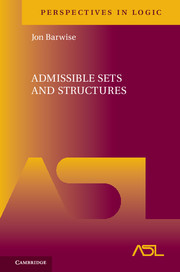Book contents
Preface to the Serie
Published online by Cambridge University Press: 31 March 2017
Summary
On Perspectives. Mathematical logic arose from a concern with the nature and the limits of rational or mathematical thought, and from a desire to systematise the modes of its expression. The pioneering investigations were diverse and largely autonomous. As time passed, and more particularly in the last two decades, interconnections between different lines of research and links with other branches of mathematics proliferated. The subject is now both rich and varied. It is the aim of the series to provide, as it were, maps or guides to this complex terrain. We shall not aim at encyclopaedic coverage; nor do we wish to prescribe, like Euclid, a definitive version of the elements of the subject. We are not committed to any particular philosophical programme. Nevertheless we have tried by critical discussion to ensure that each book represents a coherent line of thought; and that, by developing certain themes, it will be of greater interest than a mere assemblage of results and techniques.
The books in the series differ in level: some are introductory some highly specialised. They also differ in scope: some offer a wide view of an area, others present a single line of thought. Each book is, at its own level, reasonably self-contained. Although no book depends on another as prerequisite, we have encouraged authors to fit their book in with other planned volumes, sometimes deliberately seeking coverage of the same material from different points of view. We have tried to attain a reasonable degree of uniformity of notation and arrangement. However, the books in the series are written by individual authors, not by the group. Plans for books are discussed and argued about at length. Later, encouragement is given and revisions suggested. But it is the authors who do the work; if, as we hope, the series proves of value, the credit will be theirs.
- Type
- Chapter
- Information
- Admissible Sets and Structures , pp. vii - viiiPublisher: Cambridge University PressPrint publication year: 2017

